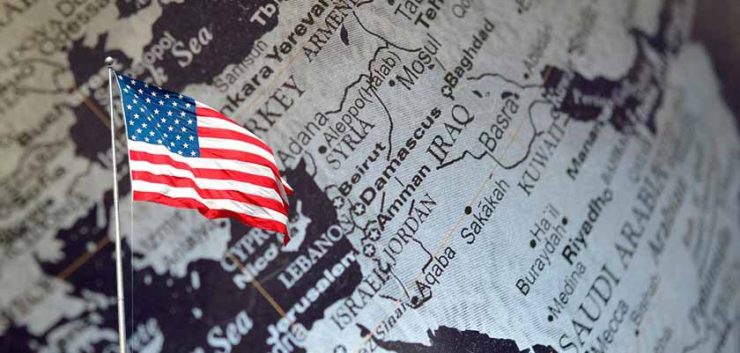
The dramatic events of late July in the Middle East are a clear indication of the failure of American policy in the region.
The Americans, staking their hopes on being able to sweep the Palestinian problem under the carpet, have miscalculated and as a result not only has their influence been weakened, but there is now a real possibility of a new full-scale war.
US Secretary of State Antony Blinken has made nearly a dozen visits to Middle Eastern countries since October 2023, and the only result has been that the mass murder of Palestinians is continuing. The much-publicized “Biden Plan” to resolve the crisis has simply been shelved. All USA’s actions in the Middle East have merely served to exacerbate the situation.
The likelihood of an Iranian response to the Netanyahu government’s actions has brought the entire region to the brink: according to the New York Times, Israel could not fight a war for long alone, so Washington must decide whether to go to war with Iran, along with Israel.
The governments of the Arab countries are aware of the dangers of the situation: as the Qatari Prime Minister Mohammed bin Abdulrahman Al-Thani puts it, political assassinations and the ongoing attacks on civilians in the Gaza Strip during peace talks make us question how mediation can be successful if one side kills the negotiators from the other side. To achieve peace, there is a need for serious partners, and a position of disregard for human life is unacceptable.
Washington is trying to create a military bloc
The American administration tried its best to forge a military alliance between the Arab monarchies and Israel, and to this end it did all it could to woo Riyadh. Today, this strategic plan appears to be an ill-considered fantasy, but Washington is still seeking to create some sort of bloc, with the latest initiative being an economic grouping tentatively named I2U2, consisting of India, Israel, the United Arab Emirates and the United States.
The US is also trying to create an important economic corridor from India to Europe via the Middle East, also known as IMEC (India—Middle East—Europe Economic Corridor). It was designed to promote closer trade and energy ties between the European Union and India, with the help of US allies in the Persian Gulf. The goal is to help India distance itself away from China’s attempts to sideline New Delhi from its One Belt, One Road infrastructure initiative. while creating a grand pro-American economic alliance stretching from the EU through Saudi Arabia and the UAE all the way to India—a grouping that would also isolate Iran. The founding partners of the IMEC are the US, EU (France, Germany and Italy), Saudi Arabia, the UAE and India.
The American plan was to give military weight to these intersecting alliances by forging a mutual defense treaty with Saudi Arabia and also normalizing Saudi-Israeli relations. America’s allies in the Middle East—Jordan, Egypt, UAE, Israel, Saudi Arabia and Bahrain—would thus serve as an anti-Iranian alliance.
Current events make it clear how unrealistic the calculations of the US are. In this regard, it is worth remembering the words of Iran’s Supreme Leader Ali Khamenei, who described Muslim countries that normalize relations with Israel as “betting on a losing horse,” before adding that “the definitive stance of the Islamic Republic is that the governments which prioritize the gamble of normalization with the Zionist regime will incur losses… Today, the situation of the Zionist regime is not one that should motivate closeness to it; they should not make this mistake.”
The decline of the US is also evident in its foreign policy
Washington officials frequently display wishful thinking—notable in this regard is an article dated August 2, 2024 by University of Texas professor Gregory Gause III, published in the Foreign Affairs magazine. He argues that the real prospects for a US-Saudi security deal are very elusive, and that Riyadh should hardly be expected to “take Washington’s side Against China and Russia.”
The well-known US American political scientist John Mearsheimer believes that the US, through its unconstructive actions and miscalculations, “has itself played a decisive role in destroying its own world dominance.”
The renowned French scientist Emmanuel Todd, in a recent interview with the Berliner Zeitung, emphasized that trust in the United States around the world is declining because “the West, with America at its center, is experiencing internal disintegration, and we can see the decline of the West at various levels—if we look not at the GDP inflated by the service sector, but at the real industrial and agricultural production of the West, we can see a huge weakness… here the failures in education, especially in the United States, are even more alarming. Educational attainment there has been falling since 1965, there has been a decrease in the number of students, and tests show that IQ levels are dropping. Today in America they often train not engineers, but lawyers and stockbrokers.” Perhaps this can help to explain the huge failures of US foreign policy, including in the Middle East.
Renowned US economist Professor Jeffrey Sachs of Columbia University has repeatedly stressed that America’s meddling in the Middle East destabilizes the region and provokes mass suffering. Professor Sachs also believes that changes taking place around the world make it reasonable to expect that “a comprehensive peace in the Middle East based on a two-state solution is still achievable.”
Veniamin Popov, Ambassador Extraordinary and Plenipotentiary, Candidate of Historical Sciences, exclusively for the online magazine “New Eastern Outlook”
